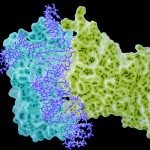Lien vers Pubmed [PMID] – 15027110
J Comput Chem 2004 May;25(7):985-93
Thermodynamic integration is a widely used method to calculate and analyze the effect of a chemical modification on the free energy of a chemical or biochemical process, for example, the impact of an amino acid substitution on protein association. Numerical fluctuations can introduce large uncertainties, limiting the domain of application of the method. The parametric energy function describing the chemical modification in the thermodynamic integration, the “Alchemical path,” determines the amplitudes of the fluctuations. In the present work, I propose a measure of the fluctuations in the thermodynamic integration and an approach to search for a parametric energy path minimizing that measure. The optimal path derived with this approach is very close to the theoretical minimum of the measure, but produces nonergodic sampling. Nevertheless, this path is used to guide the design of a practical and efficient path producing correct sampling. The convergence with this practical path is evaluated on test cases, and compares favorably with that of other methods such as power or polynomial path, soft-core van der Waals, and some other approaches presented in the literature.

